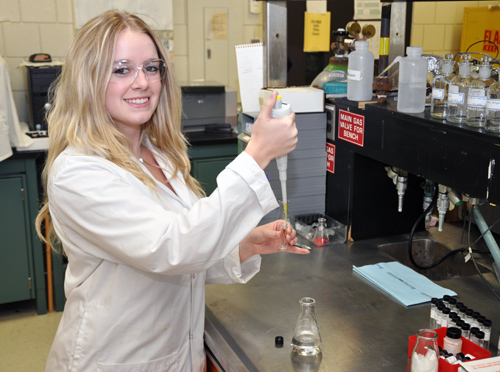
As the number of children being diagnosed with autism continues to grow, researchers in the Department of Chemistry are trying to develop a vaccine to help alleviate gastrointestinal symptoms associated with the condition.
More than 90 per cent of children with autism experience chronic and severe diarrhea and constipation. Although higher levels of a bacterial species called Clostridium bolteae have been found in their gastrointestinal tract, the connection between this bacterium and autism remains unclear.
“It’s classified as an autism-related bacterium,” says Brittany Pequegnat, a PhD student in the Department of Chemistry. “That’s because there’s no real link between the two as of yet,” but research is being done to find out whether there’s a connection. The bacteria thrive in conditions similar to those found in the human gastrointestinal tract.
“Autistic children have such a differently diverse gastrointestinal flora,” she says. The research group she’s working with, led by Prof. Mario Monteiro, is also looking at two other bacterial strains, Desulfovibrio and Sutterella. Both have been found at higher levels in children with autism and may also be linked to adverse gastrointestinal symptoms.
Pequegnat is developing a conjugate vaccine that stimulates an immune response specific to C. bolteae. With growing antibiotic resistance to “last-resort drugs” such as vancomycin, researchers are looking for methods to prevent infection by targeting certain bacterial species.
“The importance of these polysaccharide-based vaccines is that they specifically target the bacterial species of interest,” she says, “and the conjugation to a carrier protein will heighten the immunogenicity of the overall vaccine.” The vaccine’s goal is to prevent or reduce colonization of C. bolteae in the gastrointestinal tract. The lab developed a similar vaccine against Clostridium difficile infections and sold the licence to California-based Stellar Biotechnologies Inc. last summer.
“We extract, purify and characterize these polysaccharides, and from there we create our own conjugates,” says Pequegnat. She’s also developing a synthetic polysaccharide that could be created in a lab instead of being harvested from bacteria. “Our next step is doing more immunoassays to figure out whether the conjugate will in fact have a strong immunogenic response.”
Researchers at Western University are studying whether metabolites produced by C. bolteae play a role in aggressive behaviour in children with autism.
Pequegnat’s interest in health research dates back to Grade 8, when her best friend was diagnosed with diabetes. They both vowed that they would work in fields that have an impact on the lives of those who are coping with illness. “I liked the idea of treating people,” she says.
After completing her undergrad in applied pharmaceutical chemistry at U of G, she was drawn to Monteiro’s lab because of his work on vaccines designed to improve the quality of life for people living with certain diseases. “If this vaccine works,” she says, “I would hope that it is a step in the right direction and aids in subsiding some of the symptoms of autism spectrum disorders. It would be nice to give them a little more comfort in their lives.”
This vaccine research received a Discovery Grant from the Natural Sciences and Engineering Research Council of Canada.